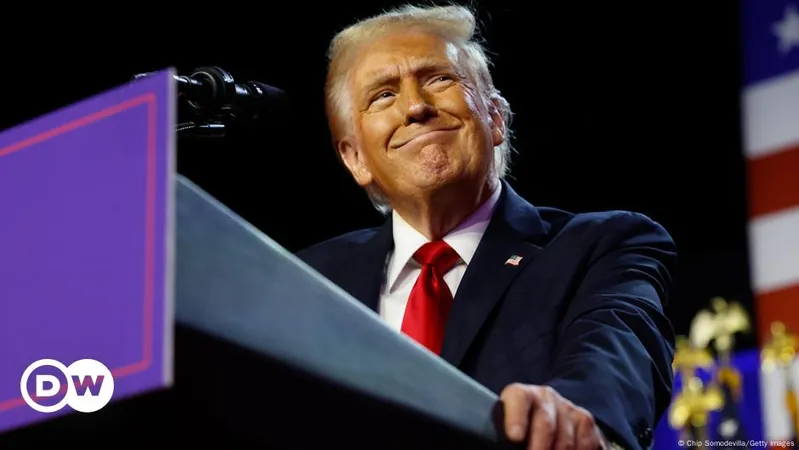
What Donald Trump's Election Win Means for the Global Economy
2024-11-06
Author: Liam
As the dust settles on the recent U.S. election, the world is bracing itself for another term under Donald Trump. With the Republican Party also seizing control of the Senate, it appears that Trump’s economic agenda is in a prime position to gain traction. The major obstacle now lies with the House of Representatives, which could either stall or facilitate his proposals.
Trump’s Economic Vision: Tariffs and Manufacturing on the Rise
A pivotal aspect of Trump’s strategy is his promise to impose substantial tariffs—ranging between 10% to 20% on all imported goods—with a staggering 60% on products from China. This mirrors some of his previous approaches but is expected to be implemented with more clarity and resolve this time around. In addition to tariffs, Trump is committed to bringing manufacturing jobs back to the U.S., reducing taxes, and taking strict measures against undocumented immigrants. These promises have resonated with voters who feel economic pressure from surging food and housing costs.
Global Market Responses: A Mixed Bag
The ripple effects of Trump’s victory are already being felt across global markets. In anticipation of the election outcome, businesses worldwide had prepared for scenarios involving either a Democratic or Republican win. Following the results, Asian stock markets displayed a split response: the Nikkei in Japan and the S&P/ASX 200 in Australia posted gains, while Hong Kong's Hang Seng Index faced a downturn. In the U.S., markets responded optimistically, with the S&P 500 Index soaring by 2.4%, the Dow Jones Industrial Average surging 3.4%, and the Nasdaq Composite leaping 2.7%—all reaching record highs. However, the bond market reacted negatively, with the yield on 10-year U.S. Treasury bonds climbing to near 4.5% due to concerns about a growing deficit under Trump's policies.
Cryptocurrency Soars: Bitcoin Breaks Records
In a surprising twist, Bitcoin reached an all-time high of over $75,000, buoyed by Trump’s pledge to make the U.S. the “crypto capital of the planet.” His administration's potential halt on cryptocurrency regulation is being cheered by industry advocates like Elon Musk, prompting significant financial contributions to support his campaign.
The Strength of the U.S. Dollar: Implications for Global Trade
As Bitcoin and other cryptocurrencies soar, traditional currencies are showing vulnerabilities against the U.S. dollar, which is rising steeply. The European Union, along with countries such as China and Mexico, are expressing concern as tariffs loom large on their exports. Notably, the Mexican peso experienced its sharpest decline in three months—a clear indicator of the risks associated with increased U.S. tariffs.
European Concerns: NATO and Economic Challenges Looming
The implications of Trump’s policies extend beyond trade. There are rising fears in Eastern Europe that Trump may weaken U.S. support for NATO, which could destabilize existing alliances amid ongoing conflicts like the war in Ukraine. Countries in the region are worried about potential economic repercussions, including inflation driven from U.S. policies that could affect their borrowing capacities. Experts warn that Trump’s return to power might pose greater challenges for the European economy compared to his first term. The head of the German Mechanical Engineering Industry Association, Thilo Brodtmann, cautioned that Trump's tariff strategies could create significant strains, leading to a shift in global trade dynamics and pressuring both European and Chinese industries to bolster their economic independence. In short, the world is on high alert as Trump embarks on his second term. The implications for global economic stability, trade policies, and international relations could be profound, and all eyes will be on how his government navigates these complexities in the coming years.









 Brasil (PT)
Brasil (PT)
 Canada (EN)
Canada (EN)
 Chile (ES)
Chile (ES)
 España (ES)
España (ES)
 France (FR)
France (FR)
 Hong Kong (EN)
Hong Kong (EN)
 Italia (IT)
Italia (IT)
 日本 (JA)
日本 (JA)
 Magyarország (HU)
Magyarország (HU)
 Norge (NO)
Norge (NO)
 Polska (PL)
Polska (PL)
 Schweiz (DE)
Schweiz (DE)
 Singapore (EN)
Singapore (EN)
 Sverige (SV)
Sverige (SV)
 Suomi (FI)
Suomi (FI)
 Türkiye (TR)
Türkiye (TR)